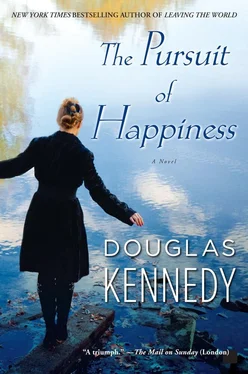I delivered 'When You Just Can't Get It Right' a day ahead of its due date. As always I celebrated with breakfast at Lindy's and the acquisition of a record at the Colony (a recording of Bach's Goldberg Variations for harpsichord, performed by Wanda Landowska - a bargain at eighty-nine cents). I heard nothing from Miss Woods for nearly forty-eight hours. By the time she called, I had convinced myself she'd so hated this new piece that my career at Saturday/ Sunday was over.
'Well, His Godship the Editor and I have been having words about you', she said as soon as I picked up the phone.
'Oh, really', I said. 'Is something wrong?'
'Yeah - he hates your stuff and wanted me to break the news to you'.
After a long pause, I managed to say: 'Well, I guess that's to be expected'.
'Jesus Christ, will you listen to yourself. Little Miss Fatalistic'.
'So he... uh... wasn't asking you to fire me?'
'Au contraire - His Godship really likes those three pieces you wrote. So much so that he wants me to offer you a contract'.
'What kind of contract?'
'What kind of contract do you think? A writing contract, you dolt. You're going to have your own weekly column in the magazine'.
'You can't be serious'.
But she was. And during the first week of 1948, my column - 'Sara Smythe's Real Life' - made its first appearance in the magazine. It was, at heart, a continuation of the three 'Slice of Life' pieces I had already written for Miss Woods. Each week, I would take an incident or a minor problem - 'The Guy With Bad Breath', 'How I Can Never Boil Spaghetti Well', 'Why I Always Buy Stockings That Run' - and turn it into a light, fast divertissement. Without question, the column celebrated the trivial, the prosaic. But it was reasonably droll - and because it was rooted in the mundanity of day-to-day female existence, I never ran out of weekly ideas.
Initially I was paid fifty dollars a column for forty-eight columns per annum. To me, this was incredible money - considering that the piece never took more than a day to write. Within six months of its inauguration, however, His Godship renegotiated my contract - after the Ladies' Home Journal and Woman's Home Companion tried to poach me. Because, much to my complete surprise, 'Sara Smythe's Real Life' had become something of a success. I was getting around fifty letters a week from women readers across the country, telling me how much they enjoyed my allegedly funny observations on what Imogen Woods called 'girly stuff. His Godship himself - Ralph J. Linklater - was also beginning to receive positive reader feedback about the column. Then two things happened which suddenly made me valuable - (a) four of Saturday/Sunday's advertisers asked for their copy to be run alongside my column, and (b) I was approached by those two ladies' magazines, and offered a considerable raise in pay if I would defect to them.
I was astonished by these offers. So astonished that I mentioned them, en passant, to Imogen Woods - dropping it halfway into a phone conversation about my next column. She sounded instantly worried.
'Honestly, Imogen', I assured her. 'I wouldn't dream of leaving the magazine. That wouldn't be ethical'.
'Well, God bless your George Washington conscience. But promise me this: don't respond to those letters until I've spoken to His Godship'.
Of course, I promised not to respond to the competing magazines. Call me naive - but I was perfectly happy being paid fifty dollars a column. Especially as it had become so straightforward to write. I didn't intend to use the other offers as a bargaining chip. When His Godship himself personally called me at home the next morning, I suddenly realized that that was what they had become.
I had met Mr Linklater just once before this conversation - when he invited me out to lunch (with Miss Woods) a few months after my column had started. He was a large, portly man who reminded me a lot of Charles Laughton. He liked to run the magazine in a grandfatherly way - but was notoriously harsh with anyone who contradicted him. As Miss Woods warned me before our lunch, 'Treat him like your favorite uncle, and he'll love you. But if you try to flash your smarts at him - not that you would - he won't respond to that at all'.
Of course, my Smythe family manners meant that I was instantly deferential to this man of authority. Afterwards, Miss Woods told me that His Godship thought I was 'just peachy' (an exact quote), and 'precisely the nice, clever sort of young woman we like writing for the magazine'.
His phone call came at eight a.m. I had been up late the night before, finishing next week's column - so I was still groggy when I reached for the phone.
'Sara - good morning! Ralph J. Linklater here. Haven't woken you, have I?'
I was instantly conscious. 'No, sir. It's nice to hear from you'.
'And it's wonderful to speak to our star columnist. You are still our star columnist, Sara... aren't you?'
'Of course, Mr Linklater. Saturday/Sunday has been so good to me'.
'Delighted to hear you say that, Sara. Because - as I'm sure you know - I like to think of all of us at Saturday/Sunday as family. You do consider us family, don't you, Sara?'
'Absolutely, Mr Linklater'.
'Wonderful. It's so good to know that. Because we consider you such a valuable part of our family. So valuable that we want to put you under an exclusive contract to us and increase your fee to eighty dollars a week'.
The word exclusive suddenly rang alarm bells in my head. I decided to tread carefully.
'Gosh, Mr Linklater, eighty dollars a week is really generous. And God knows, I really want to stay with Saturday/Sunday - but if I accept your offer, it means my income will only be eighty dollars a week. Which is kind of limiting, wouldn't you agree?'
'A hundred a week then'.
'That's very acceptable - but say someone else offers me a hundred and twenty dollars - and on a non-exclusive basis'.
'No one would do that', he said, suddenly sounding a little irritated.
'You're probably right, sir', I said, politeness itself. 'I guess the only thing that troubles me is the idea that I'd be closing off other options, other potential markets. Isn't making the best of your opportunities all part of the American Way?'
I couldn't believe I'd spoken that line (even though I knew that His Godship was always writing 'Thoughts from The Editor's Chair' pieces on O.W.L.: Our Way of Life). I couldn't believe I was suddenly in this high-stakes (for me) negotiation with our benevolent ruler, Ralph J. Linklater. But having entered into this negotiation, I knew I had to see it through.
'Yes, you're absolutely right, Sara', His Godship said with reluctance, 'a competitive marketplace is one of the great glories of American democracy. And I really respect a young woman like yourself who understands the marketability of her talents. But one hundred and twenty a column is the absolute maximum I can pay. And yes, that would be for the exclusive use of your talents. However, here's what I'm also prepared to do. According to Miss Woods, you love classical music - and know lots about it. So say you also wrote an amusing monthly column for us about how to listen to Beethoven and Brahms, which record you should give your honey for Christmas... that kind of fun thing. We'll call the column... uhm... got any thoughts on the subject?'
'How about "Music for Middlebrows"?'
'Perfect. And I'll be willing to pay you sixty dollars per month for the column, in addition to the hundred and twenty you'll be getting for "Real Life". Does that sound like a peachy deal or what?'
'Very peachy'.
Within a few days, I had a contract from Saturday/Sunday for the terms agreed with His Godship. I paid Joel Eberts to look it over. He spoke to someone in the magazine's legal affairs department, and after a bit of horse trading, got them to include a clause which allowed both parties to renegotiate the terms in eighteen months' time. Once again, Mr Eberts only charged me six dollars an hour for his services. And when he handed me his bill for twenty-four dollars, he said, 'Sorry I took the extra hour, but...'
Читать дальше












